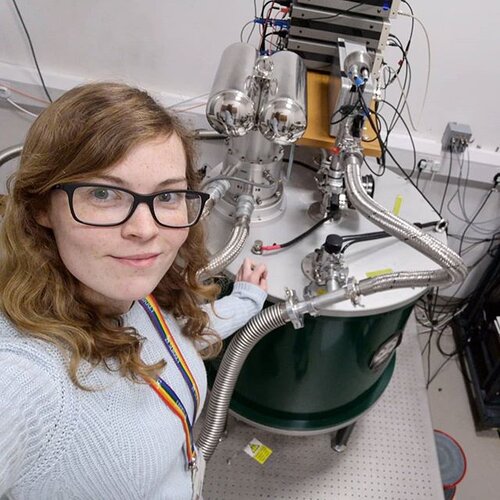
Daisy Shearer (she/her) is a PGR in the Surrey Physics Department
Q: How have you have been collaborating with or supporting other researchers at Surrey, whilst doing your PhD?
A: I regularly work with other researchers from across the ATI on my own research. I’m very lucky to be able to collaborate with engineers and materials scientists who help me with my work fabricating devices. I also seek out the expertise of theoretical physicists when interpreting my experimental results. Whenever I can, I’m looking to collaborate with other people who might have a different perspective on my research or are working on research I’m interested in.
When it comes to support, I am always looking for new ways to encourage others around me to get support when they can. I’ve written a couple of pieces for the PGR blog with the hope that it helps other PGRs at the university and those looking to study here. Particularly useful ones are ‘Maintaining a work-life balance during your PhD’ and ‘Accessing disability and neurodiversity support as a postgraduate student’. I like to share my experiences as an autistic PGR to help support others who might not know how to go about accessing appropriate support.
I am also involved with supporting underrepresented physics students. For example, I am the peer support and mentoring manager for GRADnet’s diversity network ‘IPPSnet‘ where I’m in the process of setting up a mentoring scheme for underrepresented physics students across SEPnet universities. As well as this, I am involved with promoting disability and neurodiversity support within the university. I’ve been leading a team to set up a new network for staff (including PGRs) who are neurodivergent here at Surrey.
Q: What have you gained so far by working with other researchers, that you might not have achieved on your own?
A: If I didn’t seek out the advice and expertise of other researchers, I don’t think my research would be going very well! Recognising where your knowledge is lacking and finding people who can help teach and guide you is an important research skill to have. I’m a huge believer that good science is done when it is a collaboration between lots of diverse thinkers.
Q: Why do you think it is valuable to be collegial with other researchers?
A: There are so many reasons! Whether it’s the professional reasons like building research relationships or personal reasons like making friends and helping those around you maintain good mental wellbeing. Connecting with other researchers inspires me and supporting others through their doctoral studies gives me a lot of satisfaction. I’ve had my fair share of mental health struggles throughout my PhD journey so far and I hope to alleviate some of that struggle for others through mentoring and discussing some of the issues in academia openly.
Q: How do you deal with competitiveness and imposter syndrome when working with other researchers? Is this an issue for you at all?
A: I find it quite challenging to deal with imposter syndrome. I do compare myself with others regularly so it’s easy for me to fall into the trap of feeling like I am not good enough to be a researcher. I’ve always been my own worst enemy for a long time! But over the years I’ve found some techniques that help me manage this. One is just reminding myself that everyone’s PhD is different so comparing to others isn’t really possible. Even though I sometimes get jealous of colleagues who have published already and win lots of awards, I remind myself that I am on my own path and I’m achieving things in my own way- even if that’s just the achievement of pushing back on the overwork culture in academia by taking weekends off!
Q: Does collaborating with other researchers in your community distract you from progressing with your own individual research project?
A: As I said before, I don’t think my research would be as well rounded and interesting if I didn’t collaborate with others. It definitely doesn’t distract me from my project. In fact, a lot of the best ideas I’ve had for designing new experiments have come out of talking with a colleague on something tangential to my own project.
